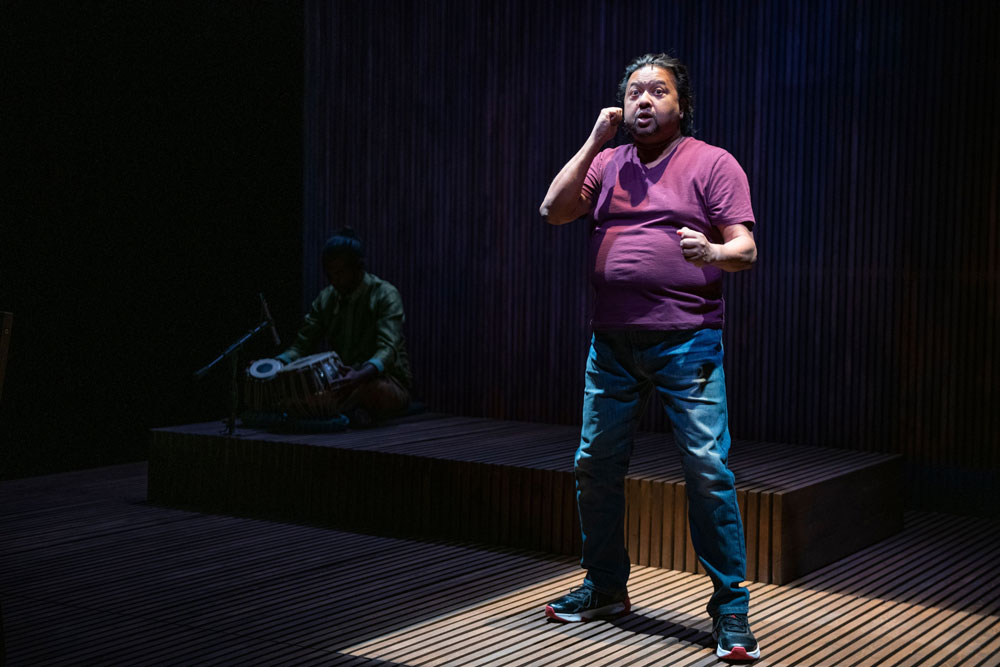
One man shows always seem to be such acts of daring. How can one person not just keep the attention of an audience for an hour and a half or more; but captivate it with the unspooling of a story? Ultimately, it’s the story that ignites the audience’s imagination. The actor’s job is to breathe life into what inevitably becomes an adventure and make the experience palpably real. If done particularly well, it’s as enthralling as Alaudin Ullah’s marvelous performance in Dishwasher Dreams now appearing at Writers Theatre in Glencoe.
A lot of people who ended up becoming trailblazers didn’t necessarily hold aspirations of doing so. For many of them, their dreams simply collided with the status quo and they found themselves on the forefront of change. Personal resolve and circumstances would eventually lead them to make groundbreaking inroads. Rita Moreno was just a girl whose love for dance led her to Hollywood where she decided to, in her words, go for it. At 17 she didn’t realize she’d be boxed in by stereotypes that would constrain her acting career; even after she won an Oscar. As a South Asian comedian also looking to score success in Tinsel Town, Ullah hit the same kind of wall in the 80’s that Moreno slammed into during the 50’s. The experience not only expanded the way he approaches his comedy, but it also made him want to fill in yawning gaps. He started writing stories that weren’t being told about people like him who were far too often casually relegated to the periphery. Dishwasher Dreams qualifies as one of those stories and it’s as personal as it gets. He talks about what made his father leave Noakhali, Bangladesh and take on New York from the bottom rung. An immigrant story that is also a raw and honest critique of race in America, Ullah’s exploration of his family’s odyssey constitutes one of the most beautiful profiles you’ll likely witness on stage or screen.

Few things about the story itself is pretty. In fact, it’s often rough, irreverent and angry as it relates the hardships of coming to a new country, landing in Spanish Harlem and having your sole career, from arrival until death, as that of a dishwasher. Ullah’s father planted shallow but tenacious roots in his adopted city, returned to Bangladesh in his 50’s looking for a wife and brought an 18-year-old bride back with him to New York. She would be destined to remain a quasi-stranger in this new land and the two sons she bore had no choice but to do what the children of immigrants must always do; live in two different and often conflicting worlds. Invariably, one of those worlds wins out over the other; with the new often dominating the old. For Ullah, it was a sharp break. Born into Islam, by the time he reached adolescence he considered himself “as much Muslim as Kim Kardashian”. He knew he was New Yorker, a poor one who loved the Yankees and adored Reggie (Mr. October) Jackson. Jackson was the undisputed hero of baseball lovers all over the country in the 70s and 80s. But he was especially revered in Spanish Harlem where fans could see themselves in the half-black and half-Puerto Rican ballplayer who commanded his sport. Ullah’s descriptions of his first trip to the Bronx to see Jackson play was transformative theater. You felt you could reach out and touch the love and adoration children have for their heroes. It was memories like those that threaded the performance with beauty. They were found in the most unlikely places. Even when it came to the trials Ullah had with his family, you could still glimpse love poking through irritation and frustration.
He took his Mr. October infatuation with him when he and his family returned to Bangladesh for visits. Still a kid, he bonded with and infected his cousin with his passion for baseball and his idol. The two became so close that Ullah promised to bring his cousin to the states when they both came of age. His cousin’s death negated the promise but left open the question of what possibilities his cousin’s life might have realized. At the very least, he would have had the opportunity to consider and pursue a future he defined for himself.

Eureka moments are not the just stuff of fantasy. Ullah had his when he caught George Carlin doing stand-up on TV. Just finishing high school and knowing full well he didn’t want to go to college, he was without direction until that chance encounter with the man who would become his inspirational north star. Carlin used comedy to tell his truths and Ullah immediately decided that comedy would allow him to do the same. At 19, defying his family’s objections, he left home to follow his own dream.
Despite its brashness, Ullah’s storytelling can often feel lyrical. Especially when his chronicle of making it in America folds back into itself to show how cyclical life’s key transitional markers can be. Like his father, he left the place that anchored him to pursue his own calling. Initial failure and hardship didn’t kill his resolve and with the input of people like Paul Mooney, he learned how to detonate a punchline and gain his creds. Dishwasher Dreams lets us relive that journey with him and glean tidbits of knowledge that reveal how humankind can be both grand and petty; regardless of our cultural roots. A physically exhausting performance, Ullah doesn’t stint and invests his all in its delivery. Avirodh Sharma provides marvelous musical backdrop and color on tabla, small hand drums used commonly in northern India, Pakistan and Bangladesh. Their sound complexity and versatility are stunning and prove ideally suited to the rhythm of the performance.
Art has the capacity to do many things. In Dishwasher Dreams, we gain a rich understanding of ourselves and others by walking with Mr. Ullah in his fascinating shoes.
Dishwasher Dreams
Through January 16, 2022
Writers Theatre
325 Tudor Court
Glencoe, IL 60022
https://www.writerstheatre.org/dishwasher-dreams
Covid Protocols: Masking, Proof of Vaccination or Negative Status